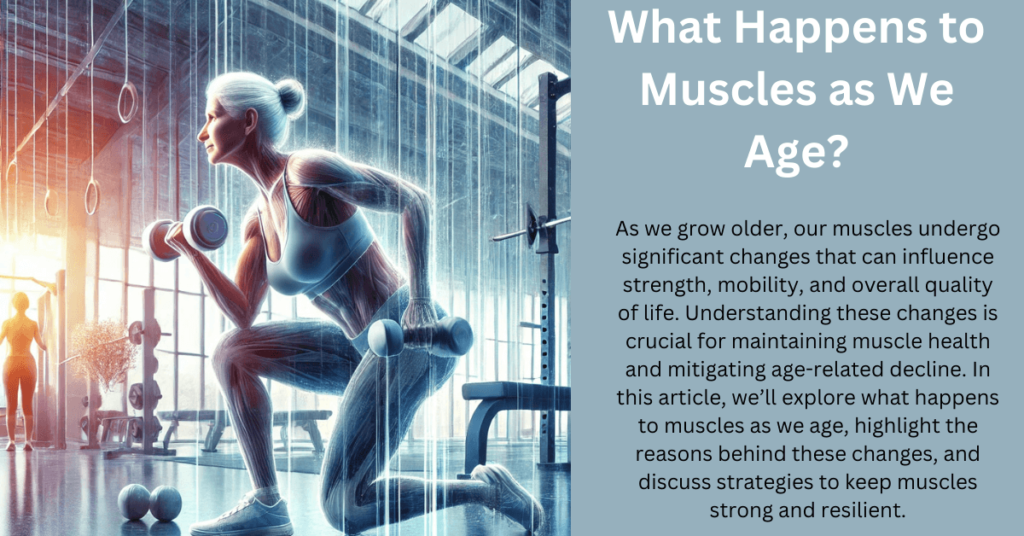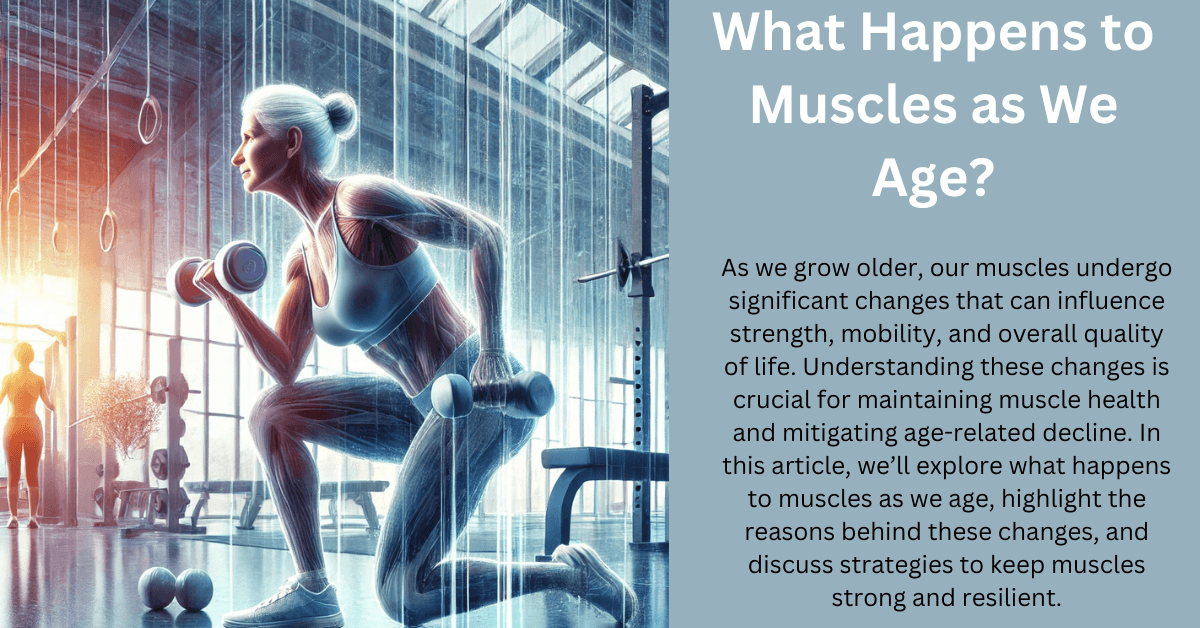What Happens to Muscles as We Age?Aging is a natural process that impacts every aspect of our bodies, including our muscular system. As we grow older, our muscles undergo significant changes that can influence strength, mobility, and overall quality of life. Understanding these changes is crucial for maintaining muscle health and mitigating age-related decline. In this article, we’ll explore what happens to muscles as we age, highlight the reasons behind these changes, and discuss strategies to keep muscles strong and resilient.

The Science of Muscle Aging: Why Do Muscles Weaken Over Time?
The gradual weakening of muscles, often referred to as sarcopenia, is a hallmark of aging. This process typically begins as early as the 30s and accelerates after the age of 60. Sarcopenia involves a decrease in muscle mass, strength, and function, which can significantly impact physical performance and independence.
One of the primary reasons muscles weaken over time is the decline in muscle protein synthesis. With age, the body becomes less efficient at repairing and rebuilding muscle fibers. Additionally, hormonal changes, such as decreased levels of testosterone and growth hormone, contribute to muscle loss. Reduced physical activity, which often accompanies aging, further exacerbates these effects, creating a cycle of muscle degradation.
Structural Changes in Muscles as We Age
Aging muscles undergo structural and functional changes that affect their performance. Key changes include:
- Reduction in Muscle Fiber Size:
- Muscle fibers, especially type II (fast-twitch) fibers responsible for strength and power, shrink with age. This reduction contributes to decreased muscle force and endurance.
- Loss of Muscle Mass:
- Known as muscle atrophy, this loss is a direct result of reduced physical activity, hormonal shifts, and lower protein intake.
- Changes in Muscle Composition:
- Aging muscles accumulate more fat and connective tissue, which can impair muscle function and flexibility.
- Diminished Nerve-Muscle Connection:
- The decline in motor neuron function reduces the nervous system’s ability to stimulate muscles effectively, leading to weakened contractions and coordination.
The Impact of Muscle Aging on Daily Life
The effects of aging on muscles go beyond reduced strength. They can influence overall health and quality of life in several ways:
- Decreased Mobility:
- Weak muscles can make everyday activities, such as climbing stairs or carrying groceries, more challenging.
- Increased Risk of Falls:
- Muscle weakness and balance issues heighten the risk of falls, which are a leading cause of injury among older adults.
- Chronic Pain:
- Loss of muscle mass can contribute to joint instability and chronic pain, particularly in the knees, hips, and lower back.
- Reduced Metabolism:
- Muscle tissue is metabolically active, so losing muscle mass can slow down metabolism and contribute to weight gain.
Preventing Muscle Loss: Strategies for Healthy Aging
While muscle aging is inevitable, there are effective ways to slow its progression and maintain muscle strength:
- Strength Training Exercises:
- Resistance training, such as weightlifting or bodyweight exercises, is one of the most effective ways to combat sarcopenia. Aim for at least two sessions per week targeting major muscle groups.
- Adequate Protein Intake:
- Consuming sufficient protein is essential for muscle repair and growth. Older adults should aim for 1.0 to 1.2 grams of protein per kilogram of body weight daily.
- Stay Physically Active:
- Regular physical activity, including walking, swimming, or yoga, helps maintain muscle function and overall fitness.
- Focus on Functional Movements:
- Incorporate exercises that mimic daily activities, such as squats, lunges, and pushing or pulling motions, to improve functional strength.
- Hormonal Balance:
- Consult a healthcare provider to address hormonal deficiencies that may affect muscle health.
The Role of Nutrition in Muscle Health
Nutrition plays a pivotal role in maintaining muscle health as we age. Key nutrients include:
- Protein:
- Lean meats, fish, eggs, dairy products, legumes, and plant-based sources like tofu and quinoa.
- Vitamin D:
- Crucial for muscle function and bone health. Sources include sunlight, fortified foods, and supplements.
- Omega-3 Fatty Acids:
- Found in fatty fish, flaxseeds, and walnuts, these help reduce inflammation and support muscle health.
- Antioxidants:
- Foods rich in antioxidants, such as berries, spinach, and nuts, combat oxidative stress that contributes to muscle aging.
Adapting to Changes: Practical Tips for Muscle Health
As muscles age, adjustments to exercise and daily routines can help mitigate challenges:
- Prioritize Warm-Ups and Cool-Downs:
- Warm up before exercise to prevent injury and cool down afterward to reduce muscle stiffness.
- Modify Intensity:
- Opt for lower-impact exercises and gradually increase intensity to match your fitness level.
- Incorporate Balance Training:
- Activities like tai chi and balance exercises improve stability and reduce fall risk.
- Listen to Your Body:
- Rest and recovery are essential, especially after intense physical activity.
The Psychological Aspect of Muscle Aging
The effects of muscle aging aren’t just physical. They can also impact mental and emotional well-being:
- Loss of Independence:
- Struggling with daily tasks can lead to frustration and reduced self-esteem.
- Social Isolation:
- Limited mobility may reduce opportunities for social interaction, contributing to feelings of loneliness.
- Motivational Challenges:
- The perceived difficulty of maintaining fitness can discourage efforts to stay active.
Addressing these challenges involves setting realistic goals, celebrating progress, and seeking support from friends, family, or fitness communities.
Emerging Research and Innovations
Advances in science and technology are shedding light on ways to combat muscle aging. Promising areas of research include:
- Gene Therapy:
- Targeting genes that regulate muscle growth and repair.
- Stem Cell Therapy:
- Exploring the use of stem cells to regenerate damaged muscle tissue.
- Smart Exercise Programs:
- Personalized fitness plans using wearable technology to optimize muscle health.
- Nutraceuticals:
- Supplements derived from natural sources that support muscle strength and recovery.
Conclusion: Aging Gracefully with Strong Muscles
Aging is inevitable, but losing muscle strength doesn’t have to be. By understanding what happens to muscles as we age and adopting proactive strategies, it’s possible to maintain muscle health and enhance overall quality of life. Strength training, proper nutrition, and staying active are key to combating the effects of aging on muscles. With the right approach, we can age gracefully and remain strong, independent, and vibrant well into our golden years.

